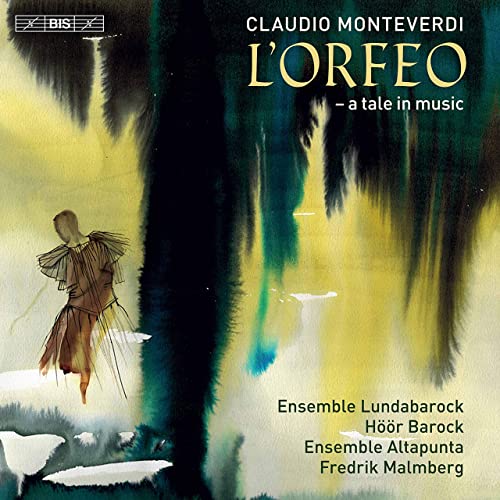Ensemble Lundabarock, Höör Barock, Ensemble Altapunta, Fredrik Malmberg
105:39 (2 CDs in a cardboard box)
BIS-2519 SACD
Click HERE to buy this on amazon.co.uk (Digital download)
[These sponsored links help the site remain alive and FREE!]
The arrival of this set gave me pause to wonder about the number of Orfeo’s I’ve reviewed in my time. It’s a fair few and I’ve actually lost track of the exact number, which is not that important anyway. What is important it is that leaving aside its crucial place in operatic history Orfeo is one of those rare operas that almost never fails to make a strong impression. The secret (leaving aside Monteverdi’s great music) is surely its uncomplicated directness, the ability for the central tragedy to penetrate the heart effortlessly. Could anything carry more grief stricken resonance than the simplicity of Orfeo’s single word response ‘Ohimè’ to the Messenger’s words, ‘La tua diletta sposa è morta’ (Your beloved wife is dead’), the exchange empty, devoid of passion?
It’s a moment that comes off with the devastating effect it must in this exceptional new recording from Sweden. It combines the forces of three early music ensembles based remarkably not in the capital but the south of the country. Brought together under the direction of Fredrik Malmberg, a young conductor making a name for himself in Europe, the performance is especially noteworthy for its near-infallible sense of style (the addition of percussion, which Monteverdi’s published full score does not call for, is in places an aggravating aberration). Above all it has been thoroughly prepared – no fewer than four Italian vocal coaches are credited – not only underlining the critical importance of the text but also in relation to ornamentation, which is invariably sung with great assurance, accuracy and precise articulation.
The cast is led by the tenor Johan Linderoth, a Baroque specialist who has worked frequently with Paul Hillier and has a particular penchant for music of the 17th century. If the timbre of his voice lacks the beauty of the most recent outstanding exponent of the role on record, Emiliano Gonzalez Toro (Naïve), it more than makes up for it in a totally idiomatic and sensitive account. As it must, the ornamented version of ‘Possente spirto’ stands at the centre at the performance and even if Linderoth doesn’t quite achieve the diamantine accuracy of Gonzalez Toro (or indeed the great Nigel Rogers) it is nevertheless a formidable accomplishment. The ‘second’ death of Euridice at the end of act four is another heart-stopping passage, vividly bringing home the moral that Orfeo has been punished not for disobedience, but because, in the words of the Chorus of Spirits that ends the act, he has not achieved ‘victory over himself’.
While it is a truism that any performance of Orfeo stands or falls on its eponymous hero, many of the supporting roles make their own demands. The present performance generally fulfils these admirably, particularly in the cases of Kristina Hellgren, who sings La Musica and Proserpina, Christine Nonbo Andersen (Ninfa 1 and Euridice) and Maria Forsström (Messaggiera). Both Hellgren and Andersen are fresh-voiced sopranos and Baroque specialists and stylists of a kind we now rarely seem to encounter in the UK. Listen, for example, to the exquisite way the former ornaments the many strophic verses of La Musica, or the perfect sense of stillness she achieves in its final lines, an evocation of nature paused. Andersen is a lovely, fragile Euridice, infinitely touching in ‘Ahi vista troppo dolce’ (act 4). Forsström is a fine mezzo who sustains the Messenger’s long story with commanding presence and a vivid communicative sense. Steffen Bruun’s Charonte is rather lugubrious, but Karl Peter Eriksson is an imposing, yet sympathetic Plutone. The roles of the various shepherds, infernal spirits and so forth are all more capably filled in what is a fine team effort.
The instrumental playing is of a high standard, my only minor caveat being some over-fussy arpeggiated continuo work from the plucked strings when chords would have been more telling and less obtrusive; Euridice’s ‘Io non dirò’ (act 1) is an example. But in sum this is a remarkable achievement and to realise just how remarkable try to imagine an Orfeo of this calibre given by early music ensembles based in the south of England.
Brian Robins
